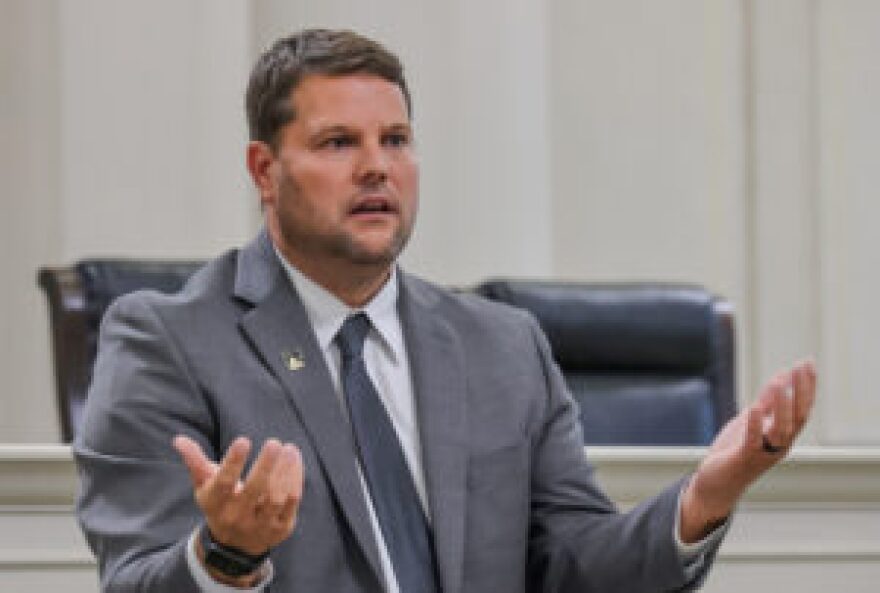From the Arkansas Advocate:
Arkansas Gov. Sarah Huckabee Sanders vetoed two bills from the 2025 legislative session on Tuesday and returned them to their respective chambers.
Both bills had emergency clauses, meaning they would have gone into effect immediately upon Sanders’ signature.
House Bill 1961 would have created limited reasons for medical providers to “temporarily withhold a patient’s medical records from being released directly to the patient or any individual authorized by the patient” for up to 30 days.
Those reasons would have included the need to review a patient’s medical information or discuss it with the patient, or if the provider “reasonably believes that immediate disclosure of the medical records may lead to the patient’s misinterpreting the information in a manner that could adversely affect the patient’s health or safety.”
“Individuals have a right to access personal medical information, including medical imaging, test results, and other health records, in a timely fashion,” Sanders wrote in a letter explaining her decision not to sign HB 1961. “Because this bill may, in some cases, unduly delay the release of such information to patients who are entitled to it, I am vetoing this legislation.”
Senate Bill 451 would have required the state Education and Human Services departments to collaboratively establish “regional behavioral health programs” to help public and charter schools determine how best to help students who display behavior “substantially likely to cause injury to the student, other students, or staff.” It also would have required both state agencies to formulate behavioral health management plans for these students and help them transition back into school after the behavioral issue has been addressed.
Sanders wrote in her veto letter that she understands the need for “sufficient interventions” and has directed the Education and Human Services departments to “come up with a solution that is more tailored to the needs of our local public schools” than SB 451.

“School administrators, teachers, and principals are increasingly managing student behavioral issues, including aggression and violence,” Sanders wrote. “These issues cause disruptions in the academic environment, distracting from schools’ core function: a safe environment where all students can learn.”
Senate President Pro Tempore Bart Hester, R-Cave Springs, was SB 451’s primary sponsor and said he appreciated Sanders’ “assurances that she understands the seriousness and the need for an immediate solution.”
“I’m less concerned with how it’s done, just that it is done,” Hester said.
SB 451 passed the Senate with a bipartisan majority of 30 votes, but it passed the House by the slimmest margin of 51 votes. Emergency clauses require two-thirds of lawmakers’ support to pass, and the House voted three times before SB 451’s emergency clause passed with 77 votes, 10 more than the minimum.
Similarly, HB 1961 passed the House with 75 votes but scraped the minimum of 18 votes in the Senate. The emergency clause subsequently passed with 26 votes when 24 were needed.

HB 1961 was sponsored by two pharmacists: Rep. Brandon Achor, R-Maumelle, and Sen. Justin Boyd, R-Fort Smith.
The intent behind HB 1961 was to give medical professionals the opportunity to “sit down and have a real conversation” about a patient’s health needs, such as a cancer diagnosis, “before this scary news or potentially unclear news gets uploaded into an electronic chart of some sort and becomes immediately available without the appropriate context and compassion and the human side of the doctor-patient relationship,” Boyd said Wednesday.
He added that he might sponsor similar legislation in the future that addresses the governor’s “implementation concerns.”
Sanders issued two vetoes last week — one that vetoed a bill to legalize the delivery of medical marijuana or the purchase of it from a drive-thru, and a line-item veto eliminating the salary for the director of the University of Arkansas at Little Rock’s Institute on Race and Ethnicity. A UALR spokesperson said the position was vacant and the university had not planned to fill it.
Lawmakers can vote to override the governor’s vetoes with a simple majority in both chambers before the sine die adjournment of a legislative session. Hester and Boyd said they do not expect to ask their colleagues to override the vetoes of their respective bills.
The Legislature concluded its session and recessed April 16, and it will reconvene May 5 to handle any unfinished business before adjourning sine die.



